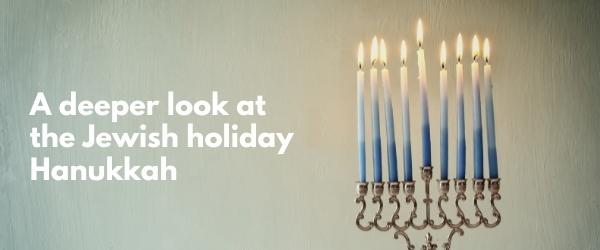

.jpg)
As part of our commitment to help build a more diverse, equitable and inclusive community for our employees and customers, Pentucket Banker Pam Webster shares the background of Hanukkah and some of its traditions. This annual Jewish celebration is observed this year between Sunday, November 28th, and Monday, December 6th.
 Pam Webster
Pam WebsterAVP, Vendor & Systems Manager
Diversity, Equity & Inclusion Committee Member
Origin of Hanukkah, the Festival of Lights
Hanukkah, the Jewish Festival of Lights, commemorates the rededication of the Second Temple in Jerusalem (in 164 B.C.) by the Maccabees after the Greek-Syrians destroyed it. Hanukkah is not a Jewish Christmas, but a story of the Jewish people fighting for their religious freedom, cultural heritage and survival as a people. It is essentially a family celebration!
 At the heart of Hanukkah is the nightly menorah lighting. The menorah, which is usually placed in a window, holds nine flames, one of which is the Shamash (leader). This candle is used to kindle the other eight lights. A candle is lit each night and by the eighth night, all eight are kindled. Hanukkah blessings are recited before the menorah is lit, and traditional songs are sung afterward. A token gift is often given on each of the eight nights.
At the heart of Hanukkah is the nightly menorah lighting. The menorah, which is usually placed in a window, holds nine flames, one of which is the Shamash (leader). This candle is used to kindle the other eight lights. A candle is lit each night and by the eighth night, all eight are kindled. Hanukkah blessings are recited before the menorah is lit, and traditional songs are sung afterward. A token gift is often given on each of the eight nights.Why is Hanukkah observed for eight days?
The Festival of Lights is the miracle of a small amount of blessed oil lasting eight nights when there was only enough for one. This miracle is what inspired the Jewish sages to proclaim an annual eight-day festival. During this "holiday of oil," it is customary to eat foods fried in oil, including dishes like potato latke (pancake) garnished with applesauce or sour cream, and jelly-filled sufganiyah (doughnut).
Other Traditions
Gelt is chocolate coins given to Jewish children during this time. It is usually wrapped in gold foil, and its history can be traced back to the decision of the Hasmoneans to mint their own nation’s coins after their military victory over the Greek Syrians. Gelt is often used to gamble in the game of dreidel.
It is customary to play with a “dreidel” (a four-sided spinning top bearing the Hebrew letters, nun, gimmel, hei and shin, an acronym for nes gadol hayah sham, “a great miracle happened there”). The game is usually played for a pot of coins, gelt or other stuff, which is won or lost, based upon which letter the dreidel lands on when it is spun.
Our hope is that you found this article informative and helpful. Pentucket Bank wishes all of our Jewish families and friends much peace, love and light during this Hanukkah.

